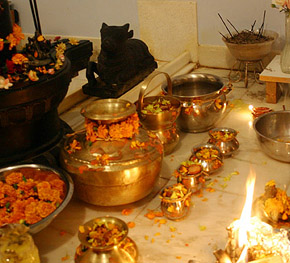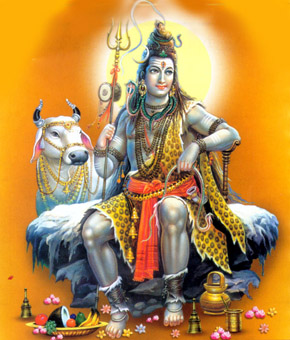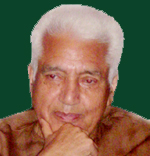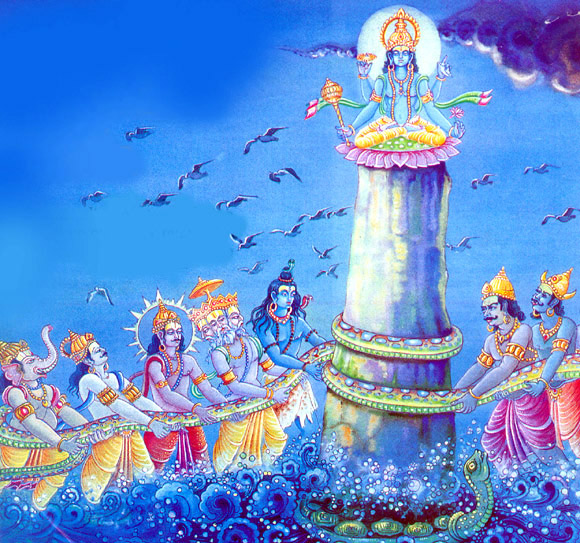 hivaratri is a festival of great significance for Hindus all over the globe. Literally meaning Shiva’s night, it represents the high state of spiritual realization when the world of relativity fades away and perfect peace and calm prevails. On this phenomenal night, the seeker remains fully aware of his identity with Shiva, the source of perennial joy and thus experiences eternal truth, bliss and lasting beauty-Satyam, Shivam, Sundaram. Esoterically, it is the most sacred moment of the union of Jiva, individual soul, and Paramatma, the Supreme Godhead. hivaratri is a festival of great significance for Hindus all over the globe. Literally meaning Shiva’s night, it represents the high state of spiritual realization when the world of relativity fades away and perfect peace and calm prevails. On this phenomenal night, the seeker remains fully aware of his identity with Shiva, the source of perennial joy and thus experiences eternal truth, bliss and lasting beauty-Satyam, Shivam, Sundaram. Esoterically, it is the most sacred moment of the union of Jiva, individual soul, and Paramatma, the Supreme Godhead.
The Legends
According to Hindu mythology, the Shiva Puran, in particular, once two of the Hindu trinity, Brahma and Vishnu, were debating about each other’s prowess. To settle the score, Shiva, the third member of the holy triad, appeared before them as a pillar of fire, a flaming Linga (historically known as Lingotbhava) and challenged them to find its beginning and the end. Awestruck by its magnitude, Brahma and Vishnu decided to find one end each to establish supremacy over the other. While Brahma took the form of a swan and went upwards, Vishnu assumed the form of Varaha - a boar and went towards the nether land.
Neither could find the end. At this point, the central part of the Pillar split open and Shiva revealed himself in His full glory on the 14th day (Chaturdashi) in the dark fortnight of the lunar month of Phalguna. It is this day that is celebrated as Mahashivaratri - the grand night of Shiva. Devotees fast during the day and pray to the Lord throughout the night. It is said that worshipping Lord Shiva on the auspicious Shivaratri night bestows one with happiness and prosperity.
Samudra Manthan
Another very popular legend linked to Shivaratri explains why people stay awake all night. It relates to Samudra Manthan, churning of the ocean, by the gods and demons, which yielded, besides nectar, a pot of poison also. The poison was toxic enough to wipe out the entire creation. On the advice of Vishnu, the gods approached Shiva who, out of compassion, undertook to swallow the poison. So as to not allow the poison to reach the stomach, Parvati pressed Shiva’s neck and thus, it stayed in His throat, changing the color of the neck. Hence, Lord Shiva is also called Neelakantha (the blue-necked one).
|
As part of the therapy, the divine physicians advised the gods to keep Shiva awake during the night. Thus, a constant vigil was kept by the gods who took turns performing various dances and playing music to amuse Shiva.
Yet a third legend has it that when Shiva and Parvati decided to live on the top of Mount Kailas, Parvati asked the Lord as to which of the many rituals observed in His honor pleased Him the most. Shiva is said to have replied, "The 14th night of the new moon, in the dark fortnight during the lunar month of Phalgun, is my most favorite day.”
Shivaratri in Kashmir
 For centuries, the Hindus of Kashmir have been observing Shivaratri with utmost zeal and elaborate rituals covering three-fourths of the lunar month of Phalguna, corresponding to Feb-March of the Gregorian calendar. The age-old traditions are followed even to this day, modified, of course, to suit the changing times. The way our displaced and uprooted brethren have been celebrating Shivaratri festival in tents and make-shift tenements for nearly two decades now shows how close this festival is to our hearts. For centuries, the Hindus of Kashmir have been observing Shivaratri with utmost zeal and elaborate rituals covering three-fourths of the lunar month of Phalguna, corresponding to Feb-March of the Gregorian calendar. The age-old traditions are followed even to this day, modified, of course, to suit the changing times. The way our displaced and uprooted brethren have been celebrating Shivaratri festival in tents and make-shift tenements for nearly two decades now shows how close this festival is to our hearts.
Keeping in view its length and its religious-cum-social overtones, Shivaratri may be compared to Durga Puja and Ganapati festivals celebrated with equal fervor, devotion and enthusiasm by the Hindus of Bengal and Maharashtra respectively.
Unlike in the rest of India and the world, where Hindus celebrate Shiva Chaturdashi, Kashmiri Pandits observe Shivaratri on the night of the 13th (trayodashi) and not 14th (chaturdashi) of the dark fortnight of the lunar month of Phalguna, for it is believed to be the day when Shiva solemnized His union with Uma, the beautiful daughter of the Himalayas. This fact also explains why some of the devotees among Kashmiri Pandits, known for their hospitality, offer even non-vegetarian food in this Puja to entertain the meat-eating Bhairavas who formed an important and major part of Shiva’s marriage party.
Shiva Chaturdashi & KPs
Perhaps because of their comparative geographical isolation from the rest of the sub-continent, Kashmiri Pandits also celebrate Shiva Chaturdashi one month earlier in the dark fortnight of the lunar month of Magha when they keep a three-day fast, worship Shiva with great devotion and completely avoid non-vegetarian preparations in their homes on these days.
Shiva Mahimna Stotra
At the end of the Shivaratri puja, one of the favorite prayers with Kashmiri Pundits is that of MAHIMNAPAAR. This is the hymn written by Pushpadanta, extolling the virtues of Shiva as an appeasement after having stolen flowers from the garden of a king named Chitraratha meant for His worship. Legend has it that the author of this most popular prayer in praise of Shiva, popularly known as Shiva Mahimna Stotra, acquired the name Pushpadanta when during his worship of Shiva he offered his teeth (danta) as flowers (pushpa) after he had been denied access to the king’s flower garden.
In recent times, Shri Ramakrishna Paramahamsa, one of the famous saints of the 19th century, went into Samadhi just by reciting a few verses from this beautiful hymn.
Here I am reproducing the first two of the forty-three verses from this great Stotra with meaning for the benefit of our readers:
महिम्नः पारं ते परमविदुषो यद्यसदृशी
स्तुतिर्ब्रह्मादीनामपि तदवसन्नास्त्वयि गिरः ।
अथाऽवाच्यः सर्वः स्वमतिपरिणामावधि गृणन्
ममाप्येष स्तोत्रे हर निरपवादः परिकरः॥ १॥
Mahimnah paaram te paramavidushho yadyasadrishii
Stutirbrahmaadiinaamapi tadavasannaastvayi girah
Athaaavaachyah sarvah svamatiparimaanaavadhi grinanh
Mamaapyeshha stotre hara nirapavaadah parikarah (1)
O, Shiva, remover of all types of miseries, what wonder is there, if the prayer to thee, chanted by one who is ignorant about thy greatness, is worthless! Because, even the utterance (speech) of Brahma and other gods is not able to fathom thy merits ( i.e. greatness ). Hence, if persons with very limited intellect like me try to offer thee a prayer, their attempt deserves thy special favor. If it is so, I should not be an exception. Hence, (thinking like this) I begin this prayer.
अतीतः पंथानं तव च महिमा वाङ्मनसयोः
अतद्व्यावृत्त्या यं चकितमभिधत्ते श्रुतिरपि।
स कस्य स्तोतव्यः कतिविधगुणः कस्य विषयः
पदे त्वर्वाचीने पतति न मनः कस्य न वचः॥ २॥
Atiitah panthaanam tava cha mahimaa vaanmanasayoh
Atadvyaavrittyaa yam chakitamabhidhatte shrutirapi
Sa kasya stotavyah katividhagunah kasya vishhayah
Pade tvarvaachiine patati na manah kasya na vachah 2
O, Great God, so great is your majesty that it cannot be reached by speech and mind. Who can praise that which even the Vedas describe with trepidation by merely saying `Neti', `Neti' (not this, not this). Who can praise thy greatness? None can enumerate thy qualities nor can the Absolute be made the object of perception. And even then the thought, mind and speech of every devotee turn eagerly to thy Saguna form.
Shiva, the Auspicious
 Shiva’ means ‘auspicious. Adi Sankara describes Him as the Pure One and interprets the name Shiva to mean "One who purifies everyone by the utterance of His name". For Sankara, Shiva is “eternal, infinite, all pervading, all knowing and all powerful.” Shiva’ means ‘auspicious. Adi Sankara describes Him as the Pure One and interprets the name Shiva to mean "One who purifies everyone by the utterance of His name". For Sankara, Shiva is “eternal, infinite, all pervading, all knowing and all powerful.”
Often portrayed as the supreme ascetic with a passive and composed disposition, Shiva lives a life of great austerity, wears tiger skin, and carries a trident and a ‘Dumroo’, a small drum, symbolizing time. The half-moon over His head and the river Ganga rising from His matted hair are supposed to reduce the effect of poison which He drank to save gods and the mankind.
Always absorbed in meditation, Shiva is also NATARAJ, the cosmic dancer who graphically expresses the rhythmic unity of life. His representation as the Shivalinga symbolizes at its simplest His creative and generative powers. Being of an elliptical shape, the Lingam denotes something which has neither beginning nor an end.
Shiva has made the snowy expanse of the Himalayas, Mount Kailash and the Holy Cave of Amarnath, His home. Kalidasa is right when he describes the Himalayas as “the massed laughter of Shiva”.
The Philosophy
Because of His being responsible for death and destruction, Shiva is believed to be at the core of the centrifugal force of the universe. Unlike Brahma, the Creator, or Vishnu, the Preserver, Shiva is the dissolving force in life. But Shiva dissolves in order to create, since death is the medium for rebirth into a new life. So the opposites of life and death and that of creation and destruction both reside in Him.
Sri Ramana Maharshi often said that Shiva signifies the Great Dissolution. Where things dissolve, there they must originate. Hence Shiva is the source of the entire creation.
Shiva, represented as the symbol of the eternal process of creation and destruction, is absolutely independent and creates all that exists under the influence of desire by the mere force of HIS WILL (Iccha Shakti). He makes the world appear in Himself as if it were distinct from Himself, though it is not so in reality.
Shiva is the supreme God of Shaivism, one of the three main branches of Hinduism, the others being Vaishnavism and Shaktism, prevalent in some of the Southern and the eastern States of India.
According to the traditions of Kashmir Shaivism, Shiva originally set forth sixty-four systems or philosophies, some purely monistic, some dualistic and some monistic theistic. When these were lost, it is said Shiva commanded sage Durvasa to revive the knowledge.
However, in the early 800 AD, Shiva appeared to Sri Vasugupta in a dream and told him of the whereabouts of a great scripture carved in rock, which to this day, is identified as Shankar Pal (Shiva’s Stone) at the eastern foot of the Mahadeva mountain, a few miles away from Harwan reservoir in  Srinagar, Kashmir’s summer capital. Vasugupta rushed to the spot and found seventy-seven Sutras etched in stone which he named the Shiva Sutras. These contain the essence of Saivagamas, the authoritative scriptures of Kashmir Shaivism. This philosophy was further developed by Vasugupta himself in his famous work ‘Spanda Karita’. He was followed by other great teachers like Somananda, Utpaldeva and the illustrious Abhinavgupta. Srinagar, Kashmir’s summer capital. Vasugupta rushed to the spot and found seventy-seven Sutras etched in stone which he named the Shiva Sutras. These contain the essence of Saivagamas, the authoritative scriptures of Kashmir Shaivism. This philosophy was further developed by Vasugupta himself in his famous work ‘Spanda Karita’. He was followed by other great teachers like Somananda, Utpaldeva and the illustrious Abhinavgupta.
In Kashmir Shaivism, Shiva is the highest metaphysical principle. His nature has primarily a twofold aspect, immanent which pervades the universe and the transcendent which is beyond the universal manifestation of time, space and form.
In His transcendental (Para) aspect, Shiva is inactive in creation. His union with Shakti (energy or activating power), represented by His consorts, Uma, Parvati, Durga, Kali and Gauri (variously named to indentify particular functions of the Divine Mother), makes the infinite enfoldments in the cosmos possible. Through the instrumentality of His consorts, Lord Shiva performs the five acts of manifestation, maintenance, grace, withdrawal and dissolution.
Popularly called the “TRIKA SHASTRA”, Kashmir Shaivism deals with the three fundamentals of human existence-Man, Universe and the Ultimate Principle governing the world. It aims at intelligent synthesis of all that is abiding, universal and enduring in various systems of Indian thought.
Shaivism does not find any sharp difference between the two ends of existence. The world of consciousness and that of senses are inseparably connected and to make lives free and unfettered, it is essential to master both. Spirituality is not something far removed from the demands of daily life and does not mean escapism or other-worldliness.
Continuing Influence
Small wonder, Kashmir Shaivism has attracted the attention of eminent thinkers, saints, sages and poets. During the medieval period, Rajanaka Shitkanth was one such luminary who elaborated on Shaiva Shastras. This great Shaivist of his times was known as “Sidha Mol” (meaning perfect father) who initiated the mystic saint-poetess of Kashmir, Lalleshwari, in yoga, mysticism and spiritulity. Both Shitikanth and Lalla hailed from Pampore village in Kashmir Valley.
This tradition was carried further in the 19th century by Swami Ram, who taught the lore to his avowed disciples-Swami Mahtab Kak, Swami Vidyadhar and Swami Gobind Kaul. Again, it was only Swami Ram’s grand-disciple, Swami Lakhsman Joo, who popularized Pratyabhijna philosophy through his writings during the 20th century among the seekers of truth in Kashmir and the outside world.
In recent times, a clear influence of Shaivism was discernible on Sri Aurobindo’s thought. Like the Shaivist thinkers of yore, the sage of Pondicherry treated the world as God’s sport. He said: “This world was not built with the bricks of chance; a conscious power has drawn the plan of life and there is meaning in every curve and line. Individual life is not cut out of the whole and must not be viewed in isolation. The whole creation is the play of the Supreme Reality (leela)”.
The great poet-philosopher, Rabindranath Tagore, avers that “Kashmir Shaivism has penetrated into that living depth of thought where diverse currents of human wisdom united in a luminous synthesis.”
|
 *A journalist by profession, a scholar by temperament and a writer by choice, Gopinath Raina was inclined to the study of religion from his very young age. It was Swami Vivekananda’s dynamic exposition of Hindu thought that fired his imagination while he was still at school, and by the time he entered college, he had been drawn to the writings of Gandhi, Aurobindo, Narayana Guru, Radhakrishnan and Bertrand Russel. *A journalist by profession, a scholar by temperament and a writer by choice, Gopinath Raina was inclined to the study of religion from his very young age. It was Swami Vivekananda’s dynamic exposition of Hindu thought that fired his imagination while he was still at school, and by the time he entered college, he had been drawn to the writings of Gandhi, Aurobindo, Narayana Guru, Radhakrishnan and Bertrand Russel.
After retiring from Indian Information Service (I.I.S.) in 1983 where he distinguished himself as an editor, correspondent, commentator and administrator in All India Radio, he edited, AICC Journal, Varnika, (Jan.'84-Dec.'90), Koshur Samachar (March'91-Oct '95, Sanatana Sandesh,(1997-2005) and KASHEER (2003-2004),
He has been writing profusely on various aspects of Hindu thought. He enjoys writing, particularly on saints and sages, not only of Kashmir, but of the other parts of India as well. Presently he lives in Miami, and spends his time writing personal memoirs.
|
Copyrights © 2007 Shehjar online and KashmirGroup.com. Any content, including but not limited to text, software, music, sound, photographs, video, graphics or other material contained may not be modified, copied, reproduced, republished, uploaded, posted, or distributed in any form or context without written permission. Terms & Conditions.
The views expressed are solely the author's and not necessarily the views of Shehjar or its owners. Content and posts from such authors are provided "AS IS", with no warranties, and confer no rights. The material and information provided iare for general information only and should not, in any respect, be relied on as professional advice. Neither Shehjar.kashmirgroup.com nor kashmirgroup.com represent or endorse the accuracy or reliability of any advice, opinion, statement, or other information displayed, uploaded, or distributed through the Service by any user, information provider or any other person or entity. You acknowledge that any reliance upon any such opinion, advice, statement, memorandum, or information shall be at your sole risk. |

 For centuries, the Hindus of Kashmir have been observing Shivaratri with utmost zeal and elaborate rituals covering three-fourths of the lunar month of Phalguna, corresponding to Feb-March of the Gregorian calendar. The age-old traditions are followed even to this day, modified, of course, to suit the changing times. The way our displaced and uprooted brethren have been celebrating Shivaratri festival in tents and make-shift tenements for nearly two decades now shows how close this festival is to our hearts.
For centuries, the Hindus of Kashmir have been observing Shivaratri with utmost zeal and elaborate rituals covering three-fourths of the lunar month of Phalguna, corresponding to Feb-March of the Gregorian calendar. The age-old traditions are followed even to this day, modified, of course, to suit the changing times. The way our displaced and uprooted brethren have been celebrating Shivaratri festival in tents and make-shift tenements for nearly two decades now shows how close this festival is to our hearts. Shivaratri The greatest Festival of Kashmiri Pandits
Shivaratri The greatest Festival of Kashmiri Pandits On Icy Trail of the Lord of Immortality
On Icy Trail of the Lord of Immortality  *A journalist by profession, a scholar by temperament and a writer by choice, Gopinath Raina was inclined to the study of religion from his very young age. It was Swami Vivekananda’s dynamic exposition of Hindu thought that fired his imagination while he was still at school, and by the time he entered college, he had been drawn to the writings of Gandhi, Aurobindo, Narayana Guru, Radhakrishnan and Bertrand Russel.
*A journalist by profession, a scholar by temperament and a writer by choice, Gopinath Raina was inclined to the study of religion from his very young age. It was Swami Vivekananda’s dynamic exposition of Hindu thought that fired his imagination while he was still at school, and by the time he entered college, he had been drawn to the writings of Gandhi, Aurobindo, Narayana Guru, Radhakrishnan and Bertrand Russel.


 Shiva’ means ‘auspicious. Adi Sankara describes Him as the Pure One and interprets the name Shiva to mean "One who purifies everyone by the utterance of His name". For Sankara, Shiva is “eternal, infinite, all pervading, all knowing and all powerful.”
Shiva’ means ‘auspicious. Adi Sankara describes Him as the Pure One and interprets the name Shiva to mean "One who purifies everyone by the utterance of His name". For Sankara, Shiva is “eternal, infinite, all pervading, all knowing and all powerful.” Srinagar, Kashmir’s summer capital. Vasugupta rushed to the spot and found seventy-seven Sutras etched in stone which he named the Shiva Sutras. These contain the essence of Saivagamas, the authoritative scriptures of Kashmir Shaivism. This philosophy was further developed by Vasugupta himself in his famous work ‘Spanda Karita’. He was followed by other great teachers like Somananda, Utpaldeva and the illustrious Abhinavgupta.
Srinagar, Kashmir’s summer capital. Vasugupta rushed to the spot and found seventy-seven Sutras etched in stone which he named the Shiva Sutras. These contain the essence of Saivagamas, the authoritative scriptures of Kashmir Shaivism. This philosophy was further developed by Vasugupta himself in his famous work ‘Spanda Karita’. He was followed by other great teachers like Somananda, Utpaldeva and the illustrious Abhinavgupta.